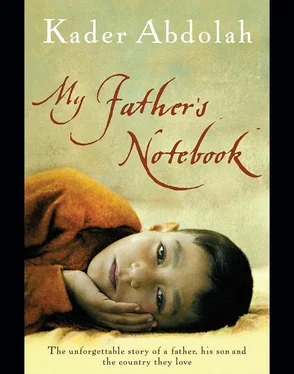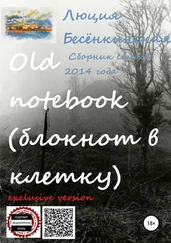Then he rode over to the mosque, where people were mourning the bride. He got down from his mule and raced inside. “Men! Allah! Allah! Look, a green scarf! Here, take my binoculars! Go up onto the roof and look before it gets dark! Akbar has reached the well!”
In the middle of the night, when everyone had begun to fear that he’d never be seen again, a dark figure strode into the town square. Akbar.
Kazem Khan wrapped a green scarf around his neck and wept.
Back before the railway had been built, in the days before the train, the area around the well had been shrouded in mystery. It was said that even the birds muffled their wing beats and bowed their heads when they flew over the well.
The train changed all that. The well used to be synonymous with inaccessibility, but that was no longer true. It was hard to know whether the railway had desecrated the site or made it even holier.
For the first two years after the train began running past the cave, the sacred well was still inaccessible.
The mountain-dwellers took no notice of the train. It was as though that newfangled thing snaking its way up to the border had nothing to do with them. After all, it was Reza Shah’s train, not theirs. Gradually, however, they got used to the steel tracks cutting through the rock to the top of Saffron Mountain.
As time went by, more and more pilgrims climbed the mountain by walking up the rails.
“Look! A road! A divine road, ready and waiting!”
Why take the treacherous mountain paths when there was a railway track? It even brought you a bit closer to the sacred well. (Did Aga Akbar use this route? It’s impossible to tell from his notes.)
Now that people had discovered this holy path, they wanted to teach the mules to climb up the railway track. But the mules refused. They were frightened by the rails, which reeked of oil, and didn’t dare place their hooves between the wooden sleepers. The older and more experienced mules, in particular, were terrified. They fled.
So, they tried younger mules. People spent days, even weeks, teaching young mules to step between the railway sleepers.
And so, an entire generation of mules growing up on Saffron Mountain went and stood on the tracks the moment you smeared a bit of oil on their muzzles. Then the pilgrims mounted the mules and the animals gingerly made their way up the mountain, one railway sleeper at a time.
The pilgrims, especially the older ones, were hesitant at first. But before long, you saw even little old ladies in chadors, giggling as their mules climbed up the tracks.
The stream of pilgrims quickly swelled. Men came to Saffron Mountain from all over the country, carrying sick children, crazed wives and ailing mothers and fathers on their backs. They hired mules to take them up the mountain.
The boom didn’t last long. On Friday evenings, when the train tooted its horn, the animals panicked. They shook off their mounts and raced back to the village and their stables. One of the mules invariably broke its leg, or even its neck. Others got their hooves caught between the rails. An old woman was sure to snag her chador on a railway bolt.
Then, one day, a couple of trucks drove up. They were loaded with fencing materials and barbed wire. Dozens of labourers from the city fenced-off the tracks and strung barbed wire over the top. Not even a snake could crawl onto the rails now.
But people discovered another route, another way to reach the sacred well. Not everyone was cut out for it. You had to be young, clever and strong.
In the past only a handful of men had been able to reach the well. In the meantime their numbers had grown. Young men and boys now risked everything to obtain the coveted green scarf. It was a great challenge. A supreme test. Perhaps the most difficult test they would ever face.
They climbed up the mountain to the place where the barbed wire came to an end. Then they waited in the dark for the train and jumped on its roof as it went by.
That part was fairly easy. It could be accomplished by almost anyone who dared to jump on top of a moving train. The decisive moment came after about fifteen minutes, when the train made a sharp turn. You had to run across the roof as fast as you could, then leap onto a rock.
To land on exactly the right rock, you needed perfect timing, agility and courage. If you missed it, your broken or dead body would be loaded on a mule the next day.
Anyone who managed to land the jump and keep his balance, gripping the rock with his toes, like a tiger, was supposed to signal his success to the villagers down below, who were watching anxiously from their rooftops. The moment someone waved from the rock, an archer would light a torch and fire it into the air.
The rest of the trip was relatively easy. To reach the sacred well, all you had to do was scale seven tricky mountain walls. Almost everyone could manage that.
Early the next morning, when you made your way back down the mountain, girls and boys and old men climbed up part of the way to greet you. They all wanted to embrace you and to touch your eyes, because you had seen the well and the holy man in the well, reading his book by the light of an oil lamp.
The situation had got out of control. As we have seen, Reza Shah was determined to modernise the country. After he banned the use of chadors in public, his agents began snatching veiled women off the streets of Tehran and throwing them in prison. He had thousands of hats sent from Paris.
His dream had been realised: the Trans-Iranian Railway now stretched from one end of the country to the other, from north to south and from east to west. Reza Shah had no doubt. The time had finally come to do away with the imams, with all that superstitious nonsense, with all those holy men in wells reading books.
“Get rid of the well!” he ordered. “Cover it up! Fill it in and send the pilgrims packing!”
Who would dare to do such a thing? To destroy the sacred well and send the pilgrims home? No one. If you so much as lifted a finger against the pilgrims, someone would set your house on fire.
But the shah insisted. No pilgrim would be allowed to climb the mountain ever again.
The pilgrims didn’t listen. They kept coming, carrying the sick and the lame to the sacred spot, where they prayed.
Then, one day, a couple of armoured cars drove up. Dozens of gendarmes leapt out with their rifles cocked.
“Go home!” they ordered.
No one moved.
“If even one mule starts up that path, I’m going to shoot. Go home!” screamed a gendarme.
An old man began to climb. The gendarme aimed his rifle at him and fired over his head.
“La ilaha illa Allah,” someone shouted.
“La ilaha illa Allah,” hundreds of pilgrims shouted in response. Then they set off towards the well.
The gendarme fired a few more shots into the air.
The pilgrims kept climbing. Finally, another gendarme dared to fire on the crowd. Two men fell to the ground. At that point the crowd turned on the gendarmes and the terrified men raced back to their armoured cars and roared off.
The next day the holy city of Qom was in an uproar. The ayatollahs who had been thrown in jail ordered the Muslims to close the bazaars and go on strike.
Reza Shah was furious.
“Plug up that well with cement!” he ordered.
Who would dare to carry out his orders?
No one.
“Then I’ll do it myself!” he said.
Early in the morning the whistle of a special railway carriage rang out over Saffron Mountain. Everyone knew immediately that something unusual was happening. No one had ever seen such an odd-looking train before. They all went up to the rooftops to see what was going on. The funny little train slowly wound its way up the mountain and stopped at the familiar curve where the young men always jumped off the train. Reza Shah got out and, with some assistance, climbed up to the sacred well. Five trained mountain climbers plodded up after him, carrying shovels, water and cement. He took off his army muffler, laid it down on a rock and went and stood with his boots planted firmly on the edge of the well. In the thirteen centuries since Mahdi had hidden in the well, no one had ever done such a thing.
Читать дальше












